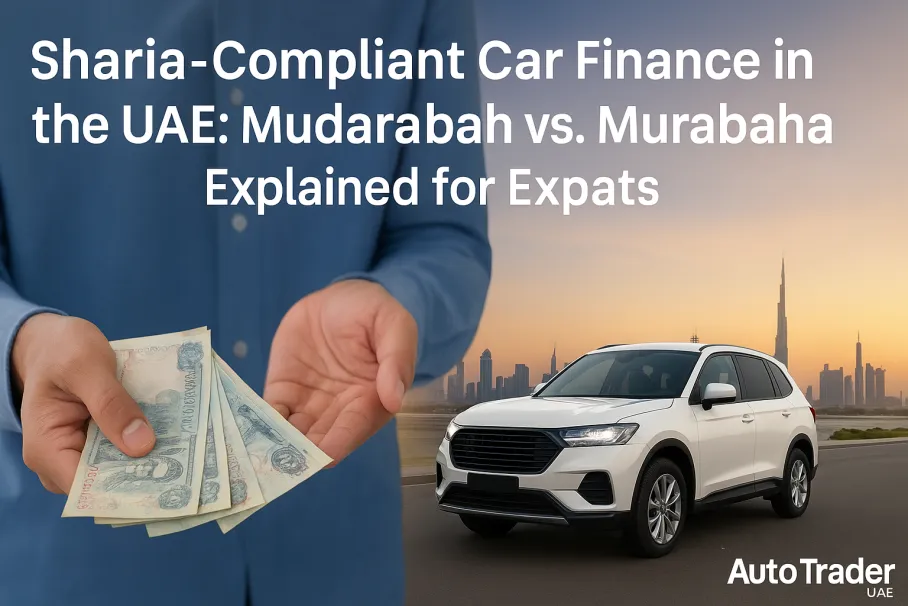Sharia-Compliant Car Finance in the UAE: Mudarabah vs. Murabaha Explained for Expats
Buying a car in the UAE is often a blend of practicality and aspiration — but for many expats, especially those seeking to align their finances with Islamic principles, the question arises: how does Sharia-compliant car finance actually work?
While conventional car loans are based on interest (riba), Islamic car finance follows ethical principles rooted in fairness, transparency, and shared risk. Two key models dominate the market — Mudarabah and Murabaha — and understanding their differences can help you make the right decision when buying your next car in Dubai, Abu Dhabi, or Sharjah.
What Is Sharia-Compliant Car Finance?
In Sharia-compliant finance, transactions must avoid interest, uncertainty (gharar), and speculation (maysir). Instead, these deals are structured around tangible assets and profit-sharing.
For car buyers, this means you don’t pay interest on a loan — you either share profits or pay a pre-agreed markup on a car the bank buys and resells to you.
Understanding Murabaha: The Cost-Plus Sale
Murabaha is the most common Islamic car finance option in the UAE. Here’s how it works:
- You choose the car you want — let’s say a 2023 Toyota Camry.
- The bank buys the vehicle from the dealer on your behalf.
- The bank then sells the car to you at a marked-up price, agreed upon in advance.
- You pay the total amount in fixed monthly installments — no interest involved.
Example:
You find a Toyota Camry worth AED 90,000. The bank buys it and resells it to you for AED 100,000, payable over 4 years. The AED 10,000 markup represents profit, not interest.
Why people choose Murabaha:
- Transparent pricing — you know the full cost upfront.
- Fixed monthly payments — easy budgeting.
- Fully Sharia-compliant — approved by Islamic scholars.
Offered by:
Mudarabah is slightly different — it’s more of a partnership than a purchase.
Here, one party (the bank) provides the capital, while the other (you) contributes effort or expertise — for example, using the car for business purposes like a delivery service or Uber-style operations.
Any profits generated are shared according to a pre-agreed ratio. However, losses are borne by the bank, unless caused by negligence or misconduct from the customer.
Example:
You enter into a Mudarabah contract to finance a used Nissan Patrol for your transport business. The bank funds the purchase, and profits from your operation are shared 70/30 between you and the bank.
This model is less common for individual car buyers and more typical in commercial or fleet financing.
Murabaha vs. Mudarabah — Comparison Table
|
Feature
|
Murabaha
|
Mudarabah
|
|
Type
|
Cost-plus financing
|
Profit-sharing partnership
|
|
Ownership
|
Immediate (after sale)
|
Shared or conditional
|
|
Risk
|
Fixed for both parties
|
Variable; shared risk
|
|
Common Use
|
Personal car finance
|
Business or fleet operations
|
|
Sharia Compliance
|
Fully compliant
|
Fully compliant
|
FAQ — Common Questions About Sharia Car Finance
Q1: Is Islamic car finance more expensive than a conventional loan?
Not necessarily. The markup in Murabaha can be similar to conventional interest rates — but the structure is ethical and transparent.
Q2: Can non-Muslims apply for Sharia-compliant finance?
Yes! Many expats choose Islamic banking because of its fairness and predictability, regardless of faith.
Q3: Are early settlements allowed?
Yes, but they may involve minor administrative fees — always check the terms with your bank.
Q4: Which banks offer the best deals?
As of 2025, ADIB and Emirates Islamic offer competitive Murabaha rates and flexible repayment terms, often with free Takaful (Islamic insurance) options.
Why It Matters for Expats in the UAE
The UAE’s multicultural population means diverse financial needs. With Sharia-compliant options like Murabaha, expats can purchase vehicles — from Toyota Land Cruisers to Tesla Model 3s — while respecting ethical and religious principles.
It’s also a great way to ensure transparency and peace of mind — especially in a market where hidden fees can surprise even seasoned buyers.
Verdict
Whether you’re eyeing a used Lexus ES for comfort or a Nissan Patrol for family trips, Sharia-compliant financing offers a path that’s ethical, transparent, and perfectly legal under UAE banking law.
Understanding the difference between Mudarabah and Murabaha ensures you’re not just buying a car — you’re making an informed financial decision aligned with your values.
Explore More:
- Best Rule for Financing a Car in Dubai | Auto Trader UAE
- Best Used Luxury Cars in Dubai Under AED 100,000 (2025)
Final Paragraph
If you’re exploring Sharia-compliant car finance options or want to compare used cars for sale in Dubai, visit www.autotraders.ae. Auto Trader UAE helps you find the best used cars in Dubai — from Toyota and Nissan to luxury models — all available with flexible financing options that suit every expat’s lifestyle.

